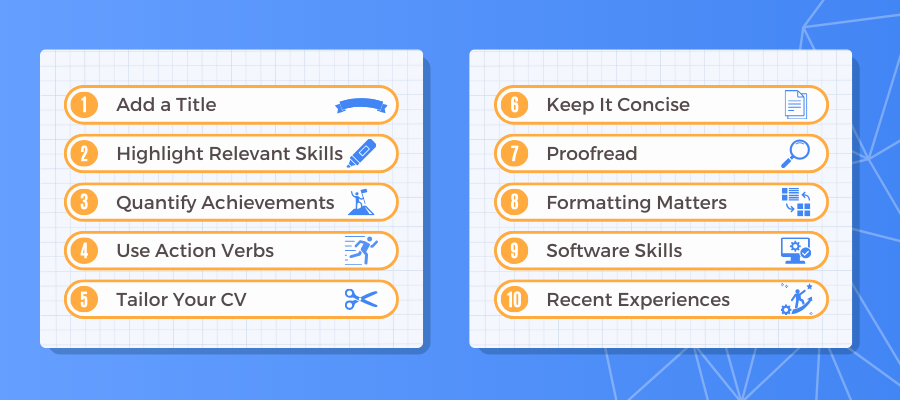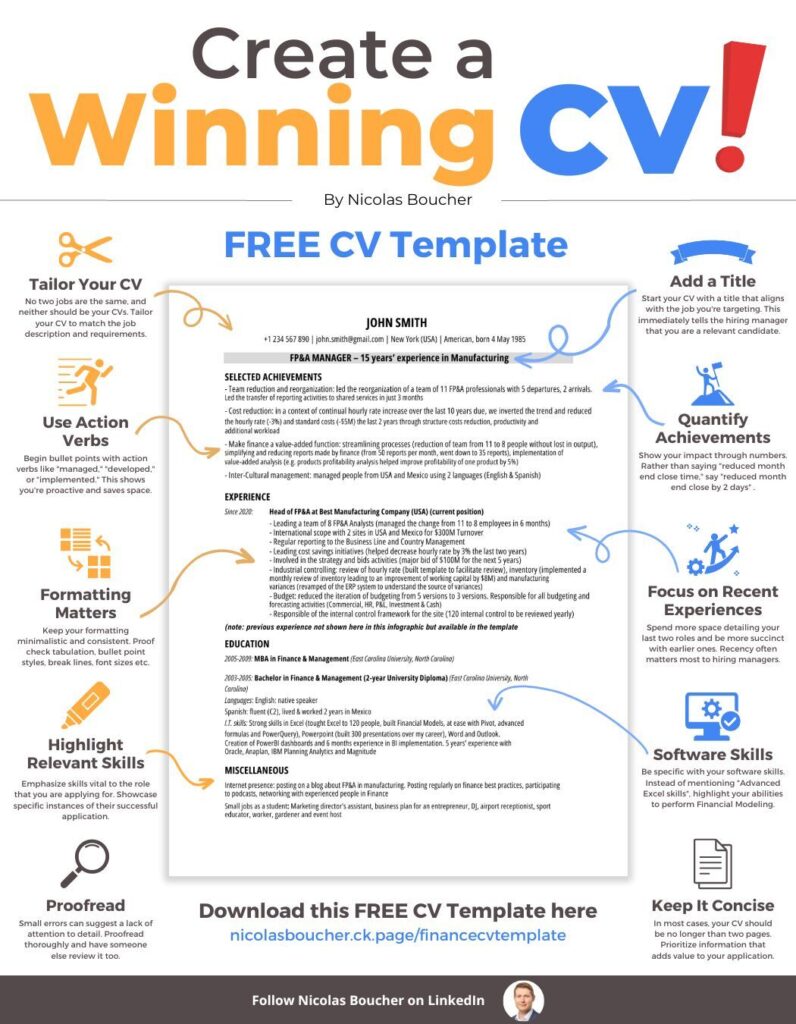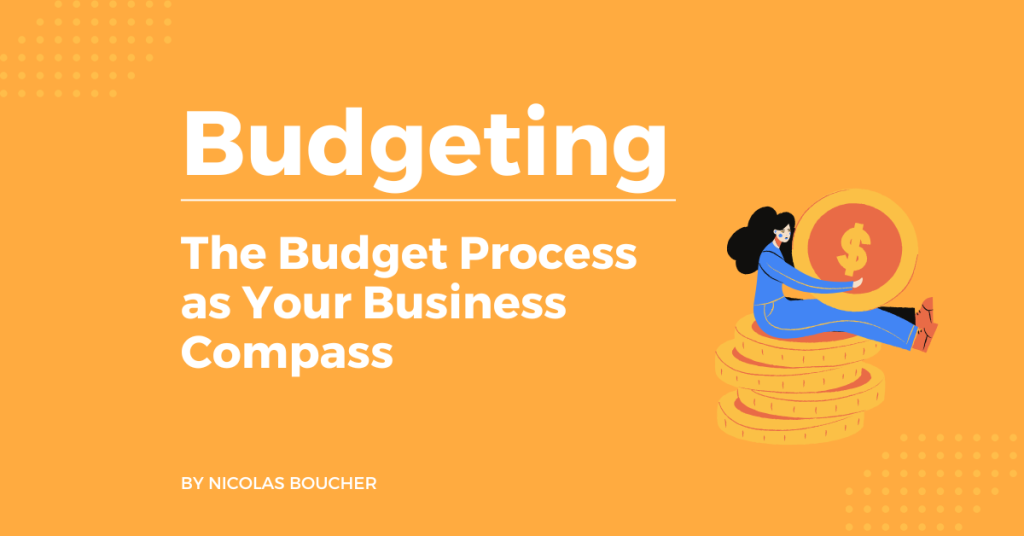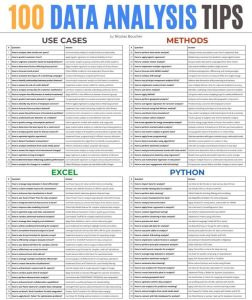We know the importance of having a strong CV that will give you an edge over the other candidates for the job you want.
But what is a strong CV?
Your CV is basically the showcase of your education, skills, and experience.
Crafting your tailored CV will increase your chance of landing your dream job and building your career.
This week, I will show you my top 10 tips for creating your winning CV.
Table of Contents
Top 10 CV Tips to Land Your Dream Job

#1: Add a Title
Start your CV with a title that aligns with the job you’re targeting.
This immediately tells the hiring manager that you are a relevant candidate.
For example:
If you are applying for a senior FP&A position, your title can be: “FP&A MANAGER – 15 years’ experience in Manufacturing”
#2: Highlight Relevant Skills
Ensure that your CV prominently displays the skills relevant to the job.
Your budgeting, forecasting, and variance analysis skills should be in the spotlight for an FP&A role. However, don’t list them as skills without explanation; rather, say how you demonstrated these skills.
For example:
“Streamlined the budget process by reducing the number of iterations from 5 versions to 3 versions” or “performed an analysis on profitability which highlighted the need to increase the price of product X by 5% to maximize the profitability.”
#3: Quantify Achievements
Show your impact through numbers.
Rather than saying “reduced month-end close time,” say “reduced month-end close by 2 days”.
Also, display the results of your impact like:
- Cost reduction: in the context of continual hourly rate increase over the last 10 years due, we inverted the trend and reduced the hourly rate (-3%) and standard costs (-$5M) the last 2 years through structure costs reduction, productivity, and additional workload
#4: Use Action Verbs
Begin bullet points with action verbs like “managed,” “developed,” or “implemented.”
This shows you’re proactive and saves space.
Also it sends strong message to your potential employer that you can carry on responsibility and get things done.
#5: Tailor Your CV
No two jobs are the same, and neither should be your CVs.
Tailor your CV to match the job description and requirements.
For example:
If you are applying for an FP&A job, make sure that your CV matches the job requirements, like years of experience, projects completed, etc.
#6: Keep It Concise
In most cases, your CV should be no longer than two pages.
Prioritize information that adds value to your application.
Use the space to display your most notable achievements, experience, and skills that are highly relevant to the job you are applying for.
#7: Proofread
Small errors can suggest a lack of attention to detail.
Proofread thoroughly and have someone else review it, too.
I have read so many CVs with obvious mistakes which disqualified the applicant.
Remember, finance is a job where attention to detail is important.
Go through your CV a few times and make sure that you don’t have discrepancies or mistakes before applying for the job.
#8: Formatting Matters
Keep your formatting minimalistic and consistent.
Proof check tabulation, bullet point styles, break lines, font sizes, etc.
#9: Software Skills
Be specific with your software skills.
For example:
Strong skills in Excel (taught Excel to 120 people, built Financial Models, at ease with Pivot, advanced formulas, and PowerQuery)
Also, instead of mentioning “Advanced Excel skills,” highlight your abilities to perform Financial Modeling, create Pivot Tables, or use Advanced Formulas.
#10: Focus on Recent Experiences
Spend more space detailing your last two roles and be more succinct with earlier ones.
Recency often matters most to hiring managers.
For example:
FP&A Manager at Manufacturing Goods Company (3 years)
- Support multi-year budget of a 500-people plant with an annual turnover of $120M
- Restructuring plan for 50 persons presented to management and group
- Managed a team of 3 FP&A Analysts on industrial activities. Responsible for hiring and training the team (team built from scratch)
Bonus
Get my FP&A Template for freeFinal Words
Your CV is more than just a document; it’s a snapshot of your career. With my tips, you’re presenting a clear, focused picture of what you bring to the table.
It’s about making sure your experience and skills are easy to understand and relevant to the role you want.
Take the time to refine your CV—it’s a small step that can make a significant difference in your job search.
Use my free CV template and tips to improve your CV and increase your chance of landing your dream job.
FAQ
Q: How do I make my CV stand out for an FP&A role?
A: To stand out, highlight your relevant skills like budgeting, forecasting, and variance analysis. Use specific examples that quantify your achievements and demonstrate how you’ve applied these skills in previous roles.
Q: Should I tailor my CV for every job application?
A: Yes, tailoring your CV is crucial. Each job has unique requirements, and adjusting your CV to match these will show that you’re a strong fit for the role.
Q: How long should my CV be?
A: Your CV should ideally be no longer than two pages. Focus on concise, relevant information that showcases your skills and achievements without overwhelming the reader.
Q: What’s the importance of using action verbs in my CV?
A: Using action verbs like “managed,” “developed,” and “implemented” makes your CV more dynamic and highlights your proactive approach. It also helps in making your achievements more impactful.
Q: Why is proofreading my CV so important?
A: Proofreading is essential because even minor errors can give the impression of a lack of attention to detail. In fields like finance, where precision is key, a mistake-free CV can set you apart from other candidates.
Q: What is the best CV layout for finance?
A: A clear, concise CV with a relevant title, quantified achievements, and tailored content is ideal for finance roles.
Q: How do you describe FP&A on a resume?
A: Highlight your budgeting, forecasting, and variance analysis skills with specific examples and quantified results.
Q: What skills do you need to be a FP&A analyst?
A: Strong Excel skills, financial modeling, budgeting, forecasting, and variance analysis are crucial for an FP&A analyst.
Q: What is the difference between FP&A and Accounting?
A: FP&A focuses on forecasting and strategic planning, while Accounting deals with historical financial reporting.
Q: How can you move from Accounting to FP&A?
A: Emphasize your analytical skills, gain experience in budgeting and forecasting, and tailor your CV to highlight relevant achievements.
















